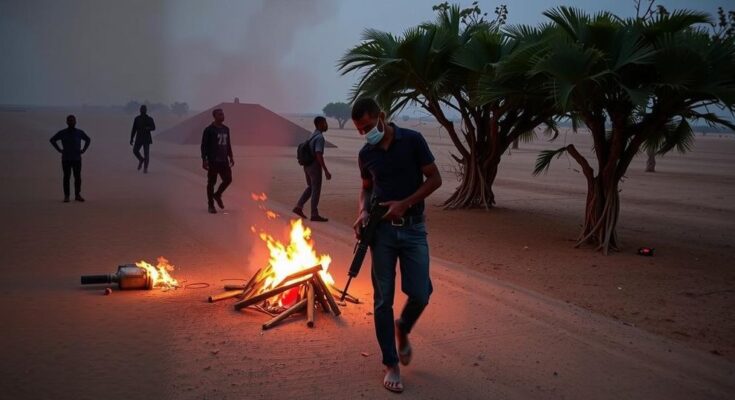Thirty-nine individuals were killed in two recent attacks in western Niger, marking a significant escalation in violence linked to jihadist groups. The Nigerien defense ministry confirmed the fatalities, with the majority occurring in Libiri and Kokorou. The region, troubled by ongoing insurgencies, continues to experience instability, prompting government calls for enhanced security and international assistance amidst growing humanitarian concerns.
Recent attacks in western Niger, near the border with Burkina Faso, have resulted in the deaths of at least 39 individuals, including children, as reported by the Nigerien defense ministry. The violent incidents occurred between December 12 and 14 in the communities of Libiri and Kokorou, both of which have been identified as regions heavily affected by jihadist activities. The ministry stated that 21 people were killed in Libiri and 18 in Kokorou, characterizing these acts as brutal assaults targeting vulnerable civilian populations by groups that are increasingly cornered by the ongoing military pressures.
The Tera region, where these attacks transpired, has long been a focal point for extremist groups associated with the Islamic State and Al-Qaeda. This area, which lies at the triple junction of Niger, Mali, and Burkina Faso, has seen persistent violent insurgencies that have significantly destabilized the borderlands. Earlier incidents highlighted the escalating violence when, on December 7, gunmen executed an assault on a goods convoy, resulting in the death of 21 civilians.
Additionally, a substantial attack on December 11 in Chatoumane allegedly led to the deaths of over 90 soldiers and 40 civilians, although Niger’s military junta has refuted these reports, labeling them as “baseless assertions” and accusing international media of disseminating false information. In a related measure, the junta has imposed a three-month suspension on BBC radio, augmenting the list of Western media sanctioned in the wake of the July 2023 coup.
Despite ongoing military operations aimed at curbing jihadist violence, Niger’s government continues to confront serious challenges due to the region’s porous borders and conducive terrain for militant groups. These entities frequently target security forces and civilians alike, prompting the government to seek increased security measures and international cooperation to adequately respond to the escalating threats. The humanitarian crisis is also exacerbating, as violence results in the displacement of thousands, rendering them vulnerable amid an already perilous situation.
The article discusses the grave security crisis in western Niger, specifically near its border with Burkina Faso. This region has experienced a surge in violent attacks perpetrated by jihadist groups, underscoring the ongoing threats to both civilians and military forces. The Nigerien government, grappling with the instability brought on by these extremist movements, has sought to bolster its security framework while also facing challenges due to external narratives regarding the rise in violence. Additionally, the article sheds light on the operational complexities in regions characterized by weak governance and porous borders, which favor the activities of militant factions.
In summary, the tragic events in western Niger reflect a worsening security situation impacted by jihadist violence that predominantly targets civilians. The Nigerien defense ministry’s confirmation of the death toll in two significant attacks highlights the urgency for robust security interventions and international support. Despite governmental denials of casualties on a larger scale, reports from credible sources emphasize the necessity for effective measures to quell the rising tide of violence and address the humanitarian implications arising from such conflicts.
Original Source: dailypost.ng




